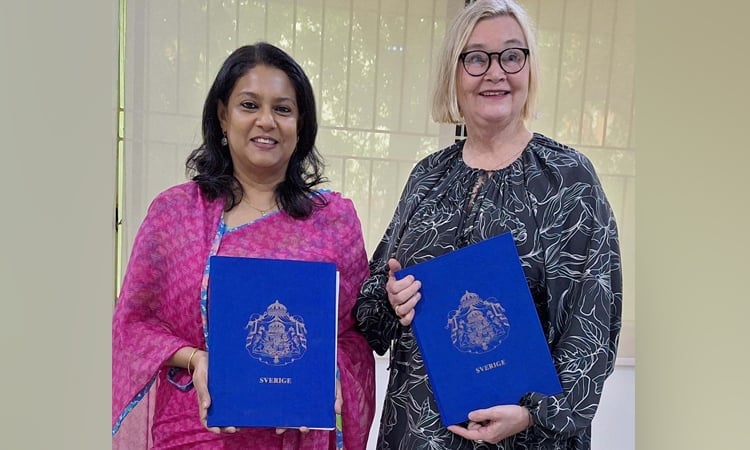News Flash
News Flash

DHAKA, July 3, 2025 (BSS) - Syeda Rizwana Hasan, adviser to the Ministry of
Environment, Forest and Climate Change (MoEFCC) and the Ministry of Water
Resources, stated today that a new project funded by the Swedish
International Development Cooperation Agency (SIDA) will play a vital role in
strengthening Bangladesh's resilience to climate change while preserving its
rich biodiversity.
She made this remark after receiving the Grant Agreement for the project
titled "Strengthening Capacity of MoEFCC, DoE and BFD for Natural Resource
Management and Improved Climate Resilience" at the Department of Environment
(DoE) in Dhaka.
Rizwana Hasan said the project will strategically enhance the institutional
capacities of the Ministry, DoE and Bangladesh Forest Department (BFD) to
address environmental and climate challenges through innovative approaches.
These include improving the monitoring of Ecologically Critical Areas (ECAs),
undertaking large-scale ecological restoration and establishing the country's
first Wildlife Trust Fund.
The event was attended by Additional Secretary Md. Khayrul Hasan, Director
General of DoE Dr. Md. Kamruzzaman and Chief Conservator of Forests Md. Amir
Hossain Chowdhury.
Earlier, the Grant Agreement was formally signed by Dr. AKM Shahabuddin,
secretary (Routine Charge) of the Economic Relations Division (ERD) and Maria
Stridsman, chargé d'affaires and head of Cooperation at the Embassy of Sweden.
Lubna Yeasmin, joint secretary of the Ministry and Nayoka Martinez Bäckström i, first
secretary and deputy head of Cooperation, were also present there.
Funded by a SIDA grant of SEK five million (approximately USD 0.53 million or
BDT 64.4 million), the project is designed to deliver comprehensive support
across three interconnected components.
It will first focus on strengthening institutional capacity, with the
Ministry taking the lead in aligning biodiversity conservation with national
and global frameworks, including the National Adaptation Plan (2023-2050) and
the Sustainable Development Goals (SDGs).
This includes developing robust monitoring plans, offering specialized
training on environmental impact assessment and equipping the DoE with
advanced tools to monitor pollution in critical rivers such as the Buriganga
and Turag.
The second major focus will be on enhancing ECA monitoring and restoration,
with special emphasis on Sonadia Island, an important ECA.
Planned interventions include conducting baseline environmental assessments,
restoring vital mangrove ecosystems, stabilizing sand dunes, and establishing
a turtle hatchery.
Local communities will play a key role in these efforts through the formation
of Village Conservation Groups (VCGs), aimed at promoting sustainable
livelihoods while reinforcing biodiversity protection.
The third component of the project is the establishment of a Wildlife Trust
Fund, which will be developed through a detailed scoping study and extensive
stakeholder consultations.
This fund aims to provide sustainable financing for the protection of
endangered species and to mitigate human-wildlife conflicts, ultimately
reducing dependence on government funding for critical conservation
initiatives.
With its targeted interventions-ranging from mangrove reforestation to
strategic policy development and grassroots conservation-the project marks a
significant step forward in Bangladesh's journey toward environmental
sustainability and climate resilience.